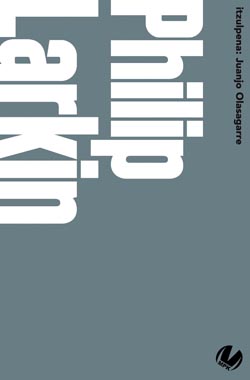
Vers de société
Andreak eta biok kakazu batzuk
gonbidatu ditugu denbora alferrikaltzera: beharbada
zuk ere etorri nahi duzu? Ahuntzaren putza, motel,
gautzen ari du.
Arnaska ari da estufa, arbolak ilunpetan kulunka.
Ba, Warlock-Williams maitea: uste dut ezetz...
Hauxe da hauxe zein zaila den bakarrik egotea.
Nahi izatera horrela joanen litzaizkidake gau asko
jerez kopa eskuan, Which baizik
leitzen ez duen urdanga baten ergelkeriei arreta emanez:
pentsa zer denboraketa xahutzen den hutsean
tenedore eta aurpegi artean aritzeagatik,
aprobetxatu beharrean lanpararen azpian
haizeak ulu egiten duela
aire zorroztuko aiztoa bezalako ilargiari begira.
Bizi osoa. Eta, hala ere, bai tinko iltzatzen digutela
Bakardadea berekoikeria da hori. Gaur egun eremitak,
abitua soinean, katilua eskuan, Jainkoarekin (alde egina) solasean,
sineste gutxi du. Nahi behinena zera da:
norberarekiko jende jatorra aurkitzea, eta horrek,
nolabait, ordezkoa ematea esan nahi du.
Bertutea soziala da. Usadioa, orduan,
elizara joatea bezala, zintzoarenak egiteko jolasa ote da?
Aspertzen gaitu, ez dugu ongi egiten
(mozolo horri bere ikerketaz galdetzea),
baina sentitu egin nahi dugu, zeren, zakar bada ere,
erakusten baitigu nola beharko lukeen?
Sotilegia, horixe. Dezenteegia. Oi, kristo,
soilik gazteak izan daitezke libre bakarrik.
Denbora gutxiago dugu besterekin egoteko
eta lanparapean esertzeak gero eta maizago
bakea beharrean, bestelako zerak ekartzen dizkigu.
Argiaz harantzago bere-berean porrota eta damua
xuxurlan:Warlock-Williams maitea, jakina baietz.
Vers de Société
My wife and I have asked a crowd of craps / To come and waste their time and ours: perhaps / You’d care to join us? In a pig’s arse, friend. / Day comes to an end. / The gas fire breathes, the trees are darkly swayed. / And so Dear Warlock-Williams: I’m afraid — // Funny how hard it is to be alone. / I could spend half my evenings, if I wanted, / Holding a glass of washing sherry, canted / Over to catch the drivel of some bitch / Who’s read nothing but Which; / Just think of all the spare time that has flown // Straight into nothingness by being filled / With forks and faces, rather than repaid / Under a lamp, hearing the noise of wind, / And looking out to see the moon thinned / To an air-sharpened blade. / A life, and yet how sternly it’s instilled // All solitude is selfish. No one now / Believes the hermit with his gown and dish / Talking to God (who’s gone too); the big wish / Is to have people nice to you, which means / Doing it back somehow. / Virtue is social. Are, then, these routines // Playing at goodness, like going to church? / Something that bores us, something we don’t do well / (Asking that ass about his fool research) / But try to feel, because, however crudely, / It shows us what should be? / Too subtle, that. Too decent, too. Oh hell, // Only the young can be alone freely. / The time is shorter now for company, / And sitting by a lamp more often brings / Not peace, but other things. / Beyond the light stand failure and remorse / Whispering Dear Warlock-Williams: Why, of course —